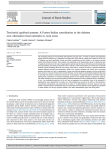Lamine C., Garçon L., Brunori G. (2019). Territorial agrifood systems: a franco-italian contribution to the debates over alternative food networks in rural areas. Journal of rural studies, 01/05/2019, vol. 68, p. 1-12.
https://doi.org/10.1016/j.jrurstud.2018.11.007
https://doi.org/10.1016/j.jrurstud.2018.11.007
| Titre : | Territorial agrifood systems: a franco-italian contribution to the debates over alternative food networks in rural areas (2019) |
| Auteurs : | C. Lamine ; L. Garçon ; G. Brunori |
| Type de document : | Article |
| Dans : | Journal of rural studies (vol. 68, May 2019) |
| Article en page(s) : | p. 1-12 |
| Langues : | Anglais |
| Langues du résumé : | Anglais |
| Catégories : |
Catégories principales 04 - DEVELOPPEMENT LOCAL ET REGIONAL ; 4.3 - Appellations liées au Territoire. Produits du Terroir. QualitéThésaurus IAMM SYSTEME ALIMENTAIRE ALTERNATIF ; DURABILITE ; TERRITOIRE ; MILIEU RURAL ; INEGALITE SOCIALE ; INDICATION GEOGRAPHIQUE PROTEGEE ; TRANSITION AGROECOLOGIQUE ; QUALITE ; LABEL DE QUALITE ; FRANCE ; ITALIE |
| Résumé : | The increasing diversity of food networks and initiatives has given rise to a variety of analyses and approaches among which the literature on “Alternative Food Networks” (AFN) and the “quality turn” stand out for the role of European and more specifically French and Italian contributions and the richness of the debates between authors from different horizons. These debates focus especially on the transformative power of alternative and/or quality food networks at the scale of larger agrifood systems and the risks of territorial and social inequity that they may embody, thus raising social justice issues. However, in the AFN literature, the central focus on specific networks (mostly emanating from the civil society) often leads to overlook the effects of possible interactions between different networks and stakeholders, while in the “quality” literature, the central focus on specialty products often leads to a lack of consideration of entire food diets and agrifood systems as well as social justice issues. Based on a focused critical review of these literature, we thus argue for an intertwined approach that aims at assessing food systems as territorial constructions. In this purpose, our approach defines the research object by starting from a hypothesis of territorial assemblage instead of from specific initiatives considered in isolation. This allows taking into account various initiatives, different ambitions and their combined effects in facilitating – or not – just sustainable transitions. We do not base our argument on an optimistic vision of the potentials of hybridisations and combinations, but rather on a critical perspective focused on the effects of the alternative/conventional confrontations (and controversies) in terms of “re-differentiation” processes. Based on two case studies in Southern France and Northern Italy, we demonstrate how this approach can be applied and contribute to wider debates over the key questions related to the AFNs’ transformative power and social justice |
| Cote : | Réservé lecteur CIHEAM |
| URL / DOI : | https://doi.org/10.1016/j.jrurstud.2018.11.007 |







